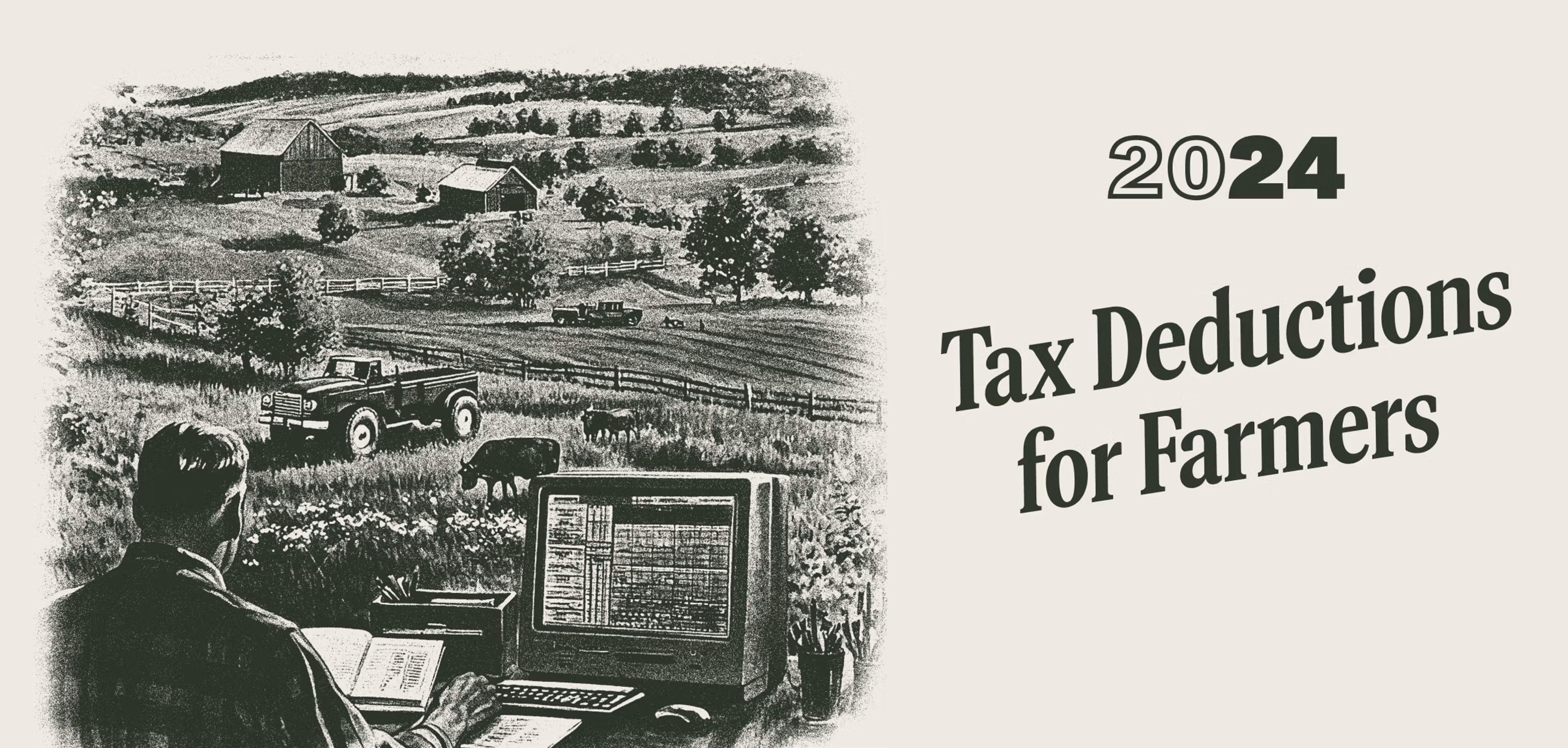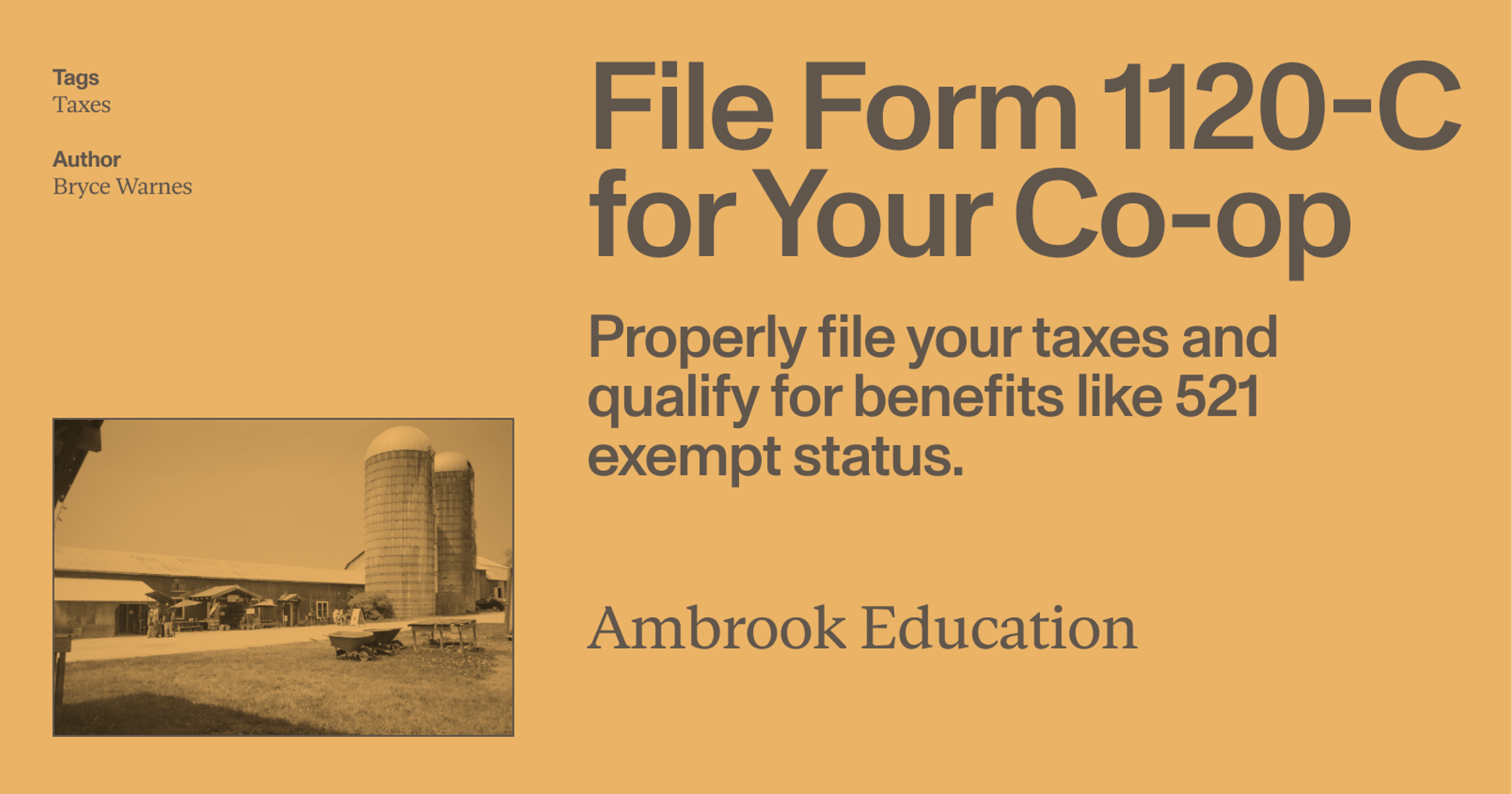Never miss another deduction again with our comprehensive four-part guide.
Staying on top of tax deductions can be difficult no matter what line of business you’re in. But it can be especially difficult in farming, where the line between personal and business use isn’t always crystal clear and the tax code is brimming with complicated rules and exceptions.
To make your business deductions easier to track down, we’ve divided them into four categories based on where you’re most likely to find them: the farm shop, the field, the office, and the personnel.
Read on for a summary of each section, dive in if you already know what you’re after, or download our handy printable PDF.
Part 1: Vehicles, Equipment, Repairs and Maintenance
Part 2: Supplies, Fertilizer, Feed and Goods Purchased for Resale
Part 3: Wages, Benefits, Business Travel and Meals
Part 4: Overhead, Fees, Taxes, Office Expenses and Utilities
Tax Deductions for Farmers: Printable PDF

What to know before you start deducting
1. Make sure it’s a business expense
According to the IRS, you can only deduct expenses that are “common” and “necessary” in your line of work. Deducting expenses you use for both business and personal purposes (i.e. vehicles and equipment) often requires extensive recordkeeping in the form of activity logs, and also some proof that they’re directly associated with your business.
2. Know the hobby rules
You can’t deduct any expenses if the IRS determines you’re a non-profit or ‘hobby’ farm. This can happen if you fail to earn a profit in 3 of the last 5 years, which is when the IRS comes in to take a closer look and determine a profit motive. If you fail the profit test, however, you might be able to postpone this process by filing IRS Form 5213.
You can find a list of factors the IRS considers in the ‘Not-for-Profit Farming’ section of the IRS Farm Tax Guide.
3. Separate farming from non-farming
Remember that not all of the income earned on a farm is considered “farming income” for tax purposes.
Processing farm commodities (e.g. wine and cheese-making, butchery, canning, jamming) is not considered farming by the IRS. Providing farming services like custom harvesting, trucking commodities to market, agritourism and running an events space also doesn’t count.
For more, check out our guide to who is and isn’t considered a farmer for tax purposes by the IRS.

Part 1: Vehicles, Equipment, Repairs and Maintenance
Most of the costs associated with purchasing and operating a farm vehicle for business use—including repairs, maintenance, fuel, parking, tolls and more—are deductible. Farmers can either itemize these expenses if they’ve kept good records or take the Standard Mileage Rate, which for 2024 is 67.0¢/mile.
If you don’t have vehicle records to prove the exact percentage of personal and business use, there’s also a ‘safe harbor’ rule that allows you to claim 75% of a vehicle’s expenses as business use without records.
Expenses related to repairing and maintaining farm vehicles, buildings, and equipment are also generally deductible as long as you don’t ‘improve’ or ‘modify’ the property in some way. If you do, you might have to capitalize and depreciate those expenses instead.
Read More: Deducting Vehicles, Equipment, Repairs and Maintenance

Part 2: Supplies, Fertilizer, Feed and Goods Purchased for Resale
Supplies like fuel, feed, fertilizer, pesticides, lime, seeds and plants used to grow crops are deductible in the year that they’re purchased and put into use, as are the costs of applying them to the land.
Most livestock and plants purchased for resale are deductible only in the year that they’re sold, however some exceptions exist for hens purchased for egg production, baby chicks, and seeds and young plants purchased for further cultivation.
Read More: Deducting Supplies, Fertilizer, Feed and Goods Purchased for Resale

Part 3: Wages, Benefits, Travel and Meals
Wages, employee benefits, pensions, and profit-sharing expenses are all generally deductible, and can include any non-cash payments made to employees in the form of inventory or assets.
Farmers can also generally deduct the cost of business-related transportation, lodging and meals, provided they’re properly recorded and don’t include personal expenses.
Read More: Employee Compensation, Benefits, Travel and Meals

Part 4: Overhead, Professional Fees, Office Expenses and Utilities
As long as they’re properly logged and separated from your personal expenses, most of the overhead costs related to your farming business—like utilities, professional fees, office supplies and marketing costs—are deductible.
Real estate and property taxes paid on farm buildings and assets, highway use taxes applied to farm vehicles, as well as social security, health insurance, and unemployment taxes paid for employees are all also generally deductible.
Farmers who use part of their home exclusively for business use as a home office may use the business use of home deduction to claim part of what they spend to purchase, maintain, or rent that home.
Read More: Deducting Overhead, Professional Fees, Office Expenses and Utilities

Depreciation and MACRS
Remember that not all expenses can be deducted immediately. Equipment, vehicles, buildings and other purchases that benefit your business for more than one year must be ‘depreciated’ or spread out and deducted over multiple years.
Read More: An Absolute Beginner’s Guide to Depreciation and MACRS

Section 179 and Bonus Depreciation
Section 179 is a special rule that allows small businesses to deduct some or all of the cost of new or used assets in the first year that they’re placed in service. This deduction can’t exceed the taxpayer’s total income for that year, or a total amount of $1,220,000 in 2024, however “bonus depreciation” can be claimed after reaching the Section 179 limit as well.
Read More: An Introduction to Section 179 and Bonus Depreciation
Kickstart your Tax Planning with Ambrook
Ambrook’s category tags correspond directly to each line on Schedule F, making it easy to compare your tax return to your records and saving you hours of work during tax season.
With time-saving bookkeeping automation features, automatically-generated financial reports, streamlined bill pay and invoicing, and other powerful accounting and financial management tools, Ambrook doesn’t just make filing your taxes easy: it takes the guesswork out of running your business. Want to learn more? Schedule a demo today.
This resource is provided for general informational purposes only. It does not constitute professional tax, legal, or accounting advice. The information may not apply to your specific situation. Please consult with a qualified tax professional regarding your individual circumstances before making any tax-related decisions.






